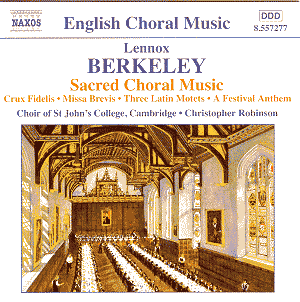The
more I hear this extraordinary and sensitively written music the
more I am astonished that, having been a lay clerk and myself
involved in church music for more years than I care to remember,
I have only sung two of the pieces on this CD. In fact I have
sung only one other of Berkeley’s choral works, the well known
Christmas motet ‘I sing of a Maiden’ (not recorded here). Why?
Well as the booklet notes by Andrew Burn say: now is at last the
time when Lennox Berkeley can have his day.
Berkeley
was a contemporary of Edmund Rubbra who was also a man of faith
and for most of his life, like Berkeley a Roman Catholic. He too
wrote much for the church. This same choir recorded for Naxos
an award-winning disc of his church music two years ago. Herbert
Howells was, unlike Berkeley and Rubbra, an Anglican. He was eleven
years older than Berkeley but is much closer to him in style and
atmosphere than Rubbra. Berkeley’s late, ethereal and lyrical
Mag’ and Nunc bear witness to what I mean. The same comment
could well apply to the moving Mass for five voices. Here, as
elsewhere on the CD, I sometimes find the boy’s vowels to be too
covered, too precious almost. I have to admit to preferring the
more open vowels more typical of good continental choristers and
also of the choir of New College Oxford.
Both
Berkeley and Howells never seem to be too far away from plainchant.
Listen to the uninhbited flexible modal lines and the seemingly
free rhythmic flow in for example the Gloria of Berkeley’s
‘Missa Brevis’. The opening intonation which is, of course, authentic
plainchant, flows and ebbs into Berkeley’s own line for ‘et in
terra pax’ so that it appears to be plainchant itself until the
illusion is phased away by the entry of another voice.
With
the ‘Festival Anthem’ of 1944 one is reminded of Berkeley’s very
particular friend and colleague Benjamin Britten. Just two year’s
before this Britten had composed ‘Rejoice in the Lamb’ for the
same commissioner, Walter Hussey, who at that time was Vicar at
the go-ahead church of St. Matthews Northampton. Berkeley takes
three texts from the so-called ‘mystical school of English poetry’,
men who were contemporary with Christopher Smart and set by Britten,
that is George Herbert and Henry Vaughan. However in my view piece
this can only rank as early and interesting. I find it unsatisfactory
in its overall balance. Its rather sudden and quiet ending is
unsatisfying and left me wondering what it led into next.
The
‘Three Latin Motets’ are wonderful pieces setting ancient texts.
They are unaccompanied and in the case of the third, the setting
of the ‘Regina Coeli’, unbuttoned … even extremely joyous. The
middle motet ‘Veni sponsa, Christi’ ends with a deliciously beautiful
Alleluia with an unexpected final chord. But talking of ‘unbuttoned’
reminds me to mention the Organ Toccata with which the CD ends.
It is quite dissonant, very virtuoso; quite different from much
of the other music.
This
is a well chosen group of pieces stretching across much of the
composer’s lifetime from 1944 to his last years of compositional
activity in the early 1980s.
The
performances are, with the exception mentioned above, exemplary.
Although you will need to turn up the volume control higher than
usual the recordings are near to faultless.
This
CD acts as an ideal farewell from Christopher Robinson who retired
from St.John’s in July 2003 after twelve years of wonderful music
making. Highly recommendable.
Gary
Higginson
See
also review by John Quinn
